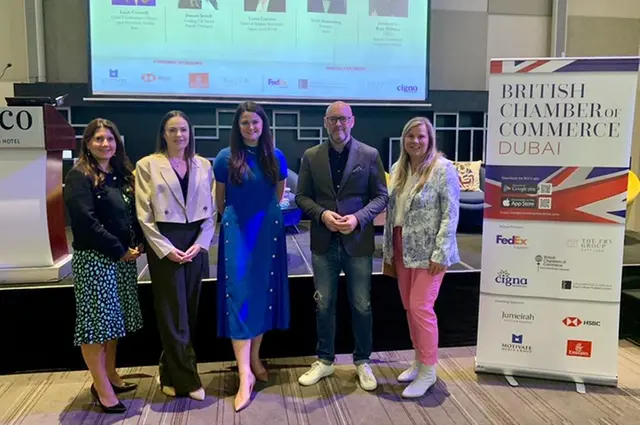The British Chamber of Commerce Dubai (BCCD) recently convened an expert panel to explore the critical role of employers in improving workplace wellbeing.
The panel discussion was the latest in the Chamber’s Business Briefings series, bringing together industry experts to explore emerging trends and provide practical advice to companies navigating the region’s business landscape.
On the panel, the group of health, wellness, and human resource professionals shared organisational solutions to the growing trend of work-related stress.
Indeed, a recent Cigna Healthcare study found that while the UAE has some of the highest vitality scores in the world, 89 per cent of UAE employees feel ‘always on’,” with 77 per cent of seeking help from employers in leading a healthier lifestyle.
At the event, unpacking these findings, Leah Cotterill, Chief Distribution Officer of Cigna Healthcare, revealed that while in the UAE, 32 per cent of respondents reported high vitality levels, 99 per cent had experienced at least one symptom of burnout over the course of the past year.
That being said, Cotterill also highlighted the shift in mindset since the pandemic, with 75 per cent of respondents acknowledging that looking after their health and wellbeing is more important than before. Sixty-five per cent also said they value personal time over a well-paid job.
“Employers need a higher focus on mental health support. Our Vitality Study is call to action is for leaders to listen to employees’ changing priorities, and adapt to evolving work preferences for a healthier, more productive environment.”
On the panel, UK-based Family Therapist Joanne Jewell also outlined the wide-ranging impacts of stress and burnout, ultimately placing a burden on a business’ bottom line through employee health insurance.
Meanwhile, Founder of mentl, Scott Armstrong, shared data from 2022 indicating that UAE businesses lost 500 million dollars an hour due to disengaged employees.
The panel emphasised that open conversations and advocacy from the top of an organisation are key to improving workforce vitality.
Head of Human Resources at Jaguar Land Rover, Laura Lawson highlighted how leadership from the C-suite has helped to embed employee wellbeing as a strategic metric across Jaguar Land Rover.
“The leadership recognises that employee wellbeing goes hand-in-hand with business performance, and you cannot be successful with a disengaged workforce.”
Lawson spotlighted various policies it had implemented in the workplace, such as hybrid working models and the option to work remotely from anywhere for 30 days a year.
Ultimately, the panel stressed the importance of taking a long-term approach to workplace wellness.
Jewell outlined that employers must demonstrate their wellbeing credentials to attract and retain talent among the incoming Generation Z employees.
Armstrong also highlighted the long-term return on investment, amounting to more than 300 per cent across organisations investing in wellness programs, while Cotterill revealed how building data over time can help to direct resources to the right vitality initiatives within a particular business.



